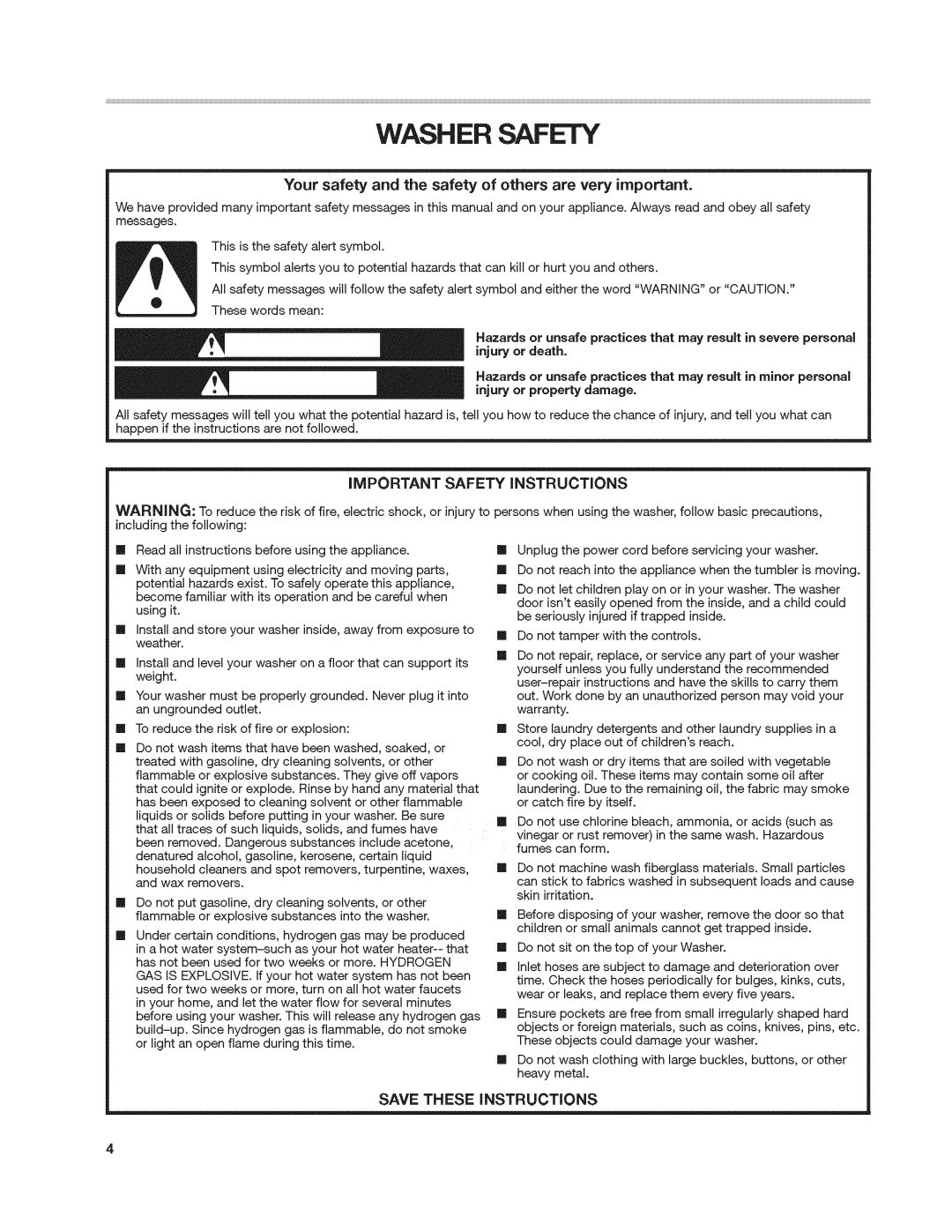
WASHER SAFETY
Your safety and the safety of others are very important.
We have provided many important safety messages in this manual and on your appliance. Always read and obey all safety messages.
®
This is the safety alert symbol.
This symbol alerts you to potential hazards that can kill or hurt you and others.
All safety messages will follow the safety alert symbol and either the word "WARNING" or "CAUTION."
These words mean:
Hazards or unsafe practices that may result in severe personal injury or death.
Hazards or unsafe practices that may result in minor personal injury or property damage.
All safety messages will tell you what the potential hazard is, tell you how to reduce the chance of injury, and tell you what can happen if the instructions are not followed.
iMPORTANT SAFETY iNSTRUCTiONS
WARNING: To reduce the risk of fire, electric shock, or injury to persons when using the washer, follow basic precautions, including the following:
[]
[]
[]
[]
[]
[]
[]
[]
[]
Read all instructions before using the appliance.
With any equipment using electricity and moving parts, potential hazards exist. To safely operate this appliance, become familiar with its operation and be careful when using it.
Install and store your washer inside, away from exposure to weather.
Install and level your washer on a floor that can support its weight.
Your washer must be properly grounded. Never plug it into an ungrounded outlet.
To reduce the risk of fire or explosion:
Do not wash items that have been washed, soaked, or treated with gasoline, dry cleaning solvents, or other flammable or explosive substances. They give off vapors that could ignite or explode. Rinse by hand any material that has been exposed to cleaning solvent or other flammable liquids or solids before putting in your washer. Be sure
that all traces of such liquids, solids, and fumes have been removed. Dangerous substances include acetone, denatured alcohol, gasoline, kerosene, certain liquid
household cleaners and spot removers, turpentine, waxes, and wax removers.
Do not put gasoline, dry cleaning solvents, or other flammable or explosive substances into the washer.
Under certain conditions, hydrogen gas may be produced
in a hot water
GAS IS EXPLOSIVE. If your hot water system has not been used for two weeks or more, turn on all hot water faucets in your home, and let the water flow for several minutes before using your washer. This will release any hydrogen gas
[] Unplug the power cord before servicing your washer.
[] Do not reach into the appliance when the tumbler is moving.
[] Do not let children play on or in your washer. The washer door isn'teasily opened from the inside, and a child could be seriously injured if trapped inside.
[] Do not tamper with the controls.
[] Do not repair, replace, or service any part of your washer yourself unless you fully understand the recommended
[] Store laundry detergents and other laundry supplies in a cool, dry place out of children's reach.
[] Do not wash or dry items that are soiled with vegetable or cooking oil. These items may contain some oil after laundering. Due to the remaining oil, the fabric may smoke or catch fire by itself.
[] Do not use chlorine bleach, ammonia, or acids (such as
vinegar or rust remover) in the same wash. Hazardous fumes can form.
[] Do not machine wash fiberglass materials. Small particles
can stick to fabrics washed in subsequent loads and cause skin irritation.
[] Before disposing of your washer, remove the door so that children or small animals cannot get trapped inside.
[] Do not sit on the top of your Washer.
[] Inlet hoses are subject to damage and deterioration over time. Check the hoses periodically for bulges, kinks, cuts, wear or leaks, and replace them every five years.
[] Ensure pockets are free from small irregularly shaped hard objects or foreign materials, such as coins, knives, pins, etc. These objects could damage your washer.
[] Do not wash clothing with large buckles, buttons, or other heavy metal.
SAVE THESE iNSTRUCTiONS
